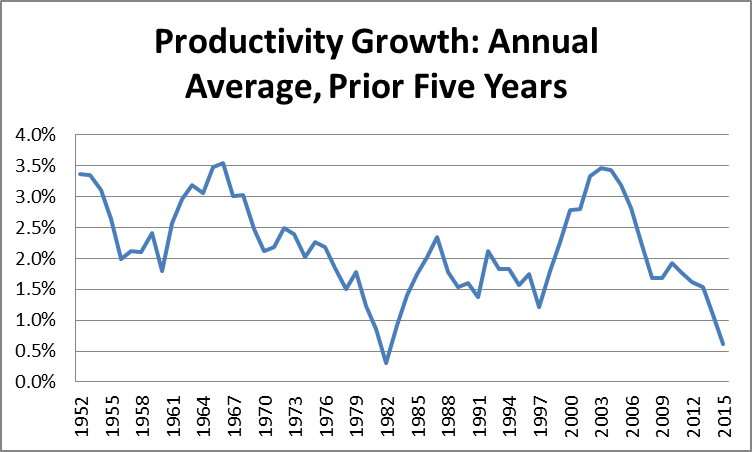March 24, 2017
Marketplace radio had a peculiar piece asking what the world would have looked like if NAFTA never had been signed. The piece is odd because it dismisses job concerns associated with NAFTA by telling readers that automation (i.e. productivity growth) has been far more important in costing jobs.
“As in, ATMs replacing bankers, robots displacing welders. Automation is a very old story that goes back 250 years, but it has really picked up in the last couple decades.
“‘We economic developers have an old joke,’ said Charles Hayes of the Research Triangle Regional Partnership in an interview with Marketplace in 2010. ‘The manufacturing facility of the future will employ two people: one will be a man, and one will be a dog. And the man will be there to feed the dog. And the dog will be there to make sure the man doesn’t touch the equipment.’
“Ouch. But it turns out technology replaced workers in the course of reporting this very story.”
Actually, the Bureau of Labor Statistics tells us the opposite. Productivity growth did pick up from 1995 to 2005, rising back to its 1947 to 1973 Golden Age pace (a period of low unemployment and rapidly rising wages), but has slowed sharply in the last dozen years.

Source: Bureau of Labor Statistics.
While more rapid productivity growth would allow for faster wage and overall economic growth, no one has a very clear path for raising the rate of productivity growth. It is strange that Marketplace thinks our problem is a too rapid pace of productivity growth.
The piece is right in saying that the jobs impact of NAFTA was relatively limited. Certainly trade with China displaced many more workers. NAFTA may nonetheless have had a negative impact on the wages of many manufacturing workers. It made the threat to move operations to Mexico far more credible and many employers took advantage of this opportunity to discourage workers from joining unions and to make wage concessions. It’s surprising that the piece did not discuss this effect of NAFTA.







Comments